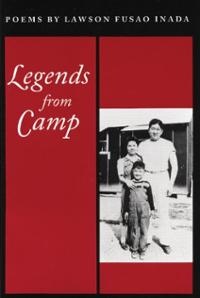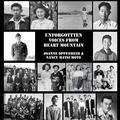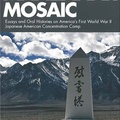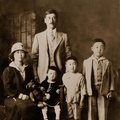I’m writing a Densho Encyclopedia entry now on the poet Lawson Fusao Inada. He’s a third-generation Japanese American who was locked up in three different U.S. government prisons during World War II.
It’s not surprising that even though he was only four years old when he was first placed behind barbed wire, the “camp” experience became a major theme in Inada’s poetry, a wound he revisited repeatedly. It’s as if he wanted to figure out what happened and recast it on his own terms, not those of the government—who said it was for his own protection—or of many of his fellow prisoners, who wanted so badly to prove their loyalty they enlisted to fight, and in many cases die, for the U.S.
There are two other great themes in Inada’s poetry that he returns to frequently for grounding and inspiration: Fresno, California, where he was born and grew up, and jazz. Fresno is where his maternal grandparents opened the city’s first fresh fish market in 1912, which became an institution that stood for 70 years. The writer William Saroyan, another native son of Fresno, recalled his grandmother sending him to The Fresno Fish Market in Chinatown.
When the order came declaring all Japanese and Japanese Americans “enemy aliens” and telling them to pack a bag and be ready to clear out, Inada’s grandfather handed the store over to trusted friends. Stories abound of prisoners who came back home at war’s end to find their businesses and property had been stolen, sometimes by “friends.” That didn’t happen to Inada’s family. When his grandfather got back, writes Inada, “he hit the ground running.”
In a short essay titled “Seven Words of Poetry,” Inada recalls that post-war period when he was studying poetry at Fresno State and helping out at the store in the afternoons:
My uncles are on break, making deliveries, whatever; my grandmother, Yoshiko Saito, is taking an order, in Japanese, over the phone. My grandfather, Busuke Saito, is out back, in the sunlight, by an orange tree he planted, placing pieces of salmon to soak in a miso cask.
Who is he? What is he like? Well, let’s just say that he’s ready. He’s always been ready, and he’s readier than you are. He’s old, fast, muscled, smart. You don’t mess with him—unless you want to be chased down the street with a knife.
Inada’s mother was born in the fish store, and Inada grew up nearby, in Chinatown on the westside of town. In truth, it was a mixed-race neighborhood of Chicano, Black, Chinese, Japanese, and Italians. In his poem “Finding the Center,” Inada writes about playing in the rich agricultural soil of Fresno with a friend.
Mama Gomez was calling us in for supper—
but tonight, if we were good, or lucky,
she would feed us sweet tortillas
and the crunchiest iced tea
as we sat on the porch, watching
moths meet the moon, fluttering stars,
and whatever else was doing on C Street.
These evocative images and tales were rolling around fresh in my mind when I read a wonderful article titled “From a Tortilla, The Feeling of a Warm Embrace” in The New York Times earlier this week. Writer Manny Fernandez also looks back in time to a grandparent in Fresno, a Mexican American grandmother who, like Inada’s mother and grandmother, “straddled the three cultures of her state, her country and her heritage.” Fernandez, a reporter for the Times, writes of how his grandmother, Cuca, cooked meals of tacos and burritos for the Mexican farmworkers who lodged at his great-grandmother’s boarding house.
“The masa pressed by her hands made the flour tortillas flattened by her hands for the tacos filled by her hands. Decades later, I probably walked by those anonymous farmworkers and their descendants at Fashion Fair Mall or Fresno State University. We had Cuca’s tacos in common,” he writes.
What’s a little amazing to think about is that Inada probably walked by those farmworkers and their descendants and maybe even Fernandez or his parents, all of whom had tasted Fresno’s sweet tortillas, tacos, and burritos—and maybe even fresh fish from The Fresno Fish Market.
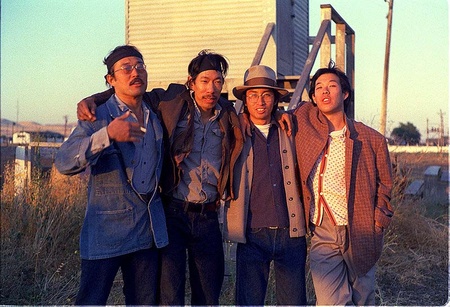
From Wikipedia: Poet Lawson Inada with American playwright Frank Chin, novelist Shawn Wong and actor Michael Chan relaxing on location near Santa Rita in Northern California in John Korty's 1976 film, "Farewell to Manzanar." Photo by Nancy Wong
*This article was originally published on Nancy Matsumoto’s blog Walking and Talking on October 11, 2013.
© 2013 Nancy Matsumoto


